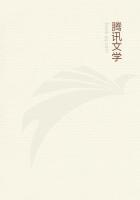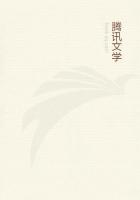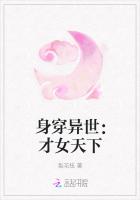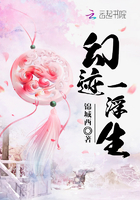JOHN (reading).
"And spare you one day from your place At her feet." . . .
Pray forgive me the passing grimace.
I wish you had MY place!
(reads)
"I trust you will feel I desire nothing much. Your friend," . . .
Bless me! "Lucile?"
The Countess de Nevers?
ALFRED.
Yes.
JOHN.
What will you do?
ALFRED.
You ask me just what I would rather ask you.
JOHN.
You can't go.
ALFRED
I must.
JOHN.
And Matilda?
ALFRED.
Oh, that You must manage!
JOHN.
Must I? I decline it, though, flat.
In an hour the horses will be at the door, And Matilda is now in her habit. Before I have finished my breakfast, of course I receive A message for "dear Cousin John!" . . . I must leave At the jeweller's the bracelet which YOU broke last night;
I must call for the music. "Dear Alfred is right:
The black shawl looks best: WILL I change it? Of course I can just stop, in passing, to order the horse.
Then Beau has the mumps, or St. Hubert knows what;
WILL I see the dog-doctor?" Hang Beau! I will NOT.
ALFRED.
Tush, tush! this is serious.
JOHN.
It is.
ALFRED.
Very well, You must think--
JOHN.
What excuse will you make, tho'?
ALFRED.
Oh, tell Mrs. Darcy that . . . lend me your wits, Jack! . . . The deuce!
Can you not stretch your genius to fit a friend's use?
Excuses are clothes which, when ask'd unawares, Good Breeding to Naked Necessity spares, You must have a whole wardrobe, no doubt.
JOHN.
My dear fellow, Matilda is jealous, you know, as Othello.
ALFRED.
You joke.
JOHN.
I am serious. Why go to Luchon?
ALFRED.
Don't ask me. I have not a choice, my dear John.
Besides, shall I own a strange sort of desire, Before I extinguish forever the fire Of youth and romance, in whose shadowy light Hope whisper'd her first fairy tales, to excite The last spark, till it rise, and fade far in that dawn Of my days where the twilights of life were first drawn By the rosy, reluctant auroras of Love;
In short, from the dead Past the gravestone to move;
Of the years long departed forever to take One last look, one final farewell; to awake The Heroic of youth from the Hades of joy, And once more be, though but for an hour, Jack--a boy!
JOHN.
You had better go hang yourself.
ALFRED.
No! were it but To make sure that the Past from the Future is shut, It were worth the step back. Do you think we should live With the living so lightly, and learn to survive That wild moment in which to the grave and its gloom We consign'd our heart's best, if the doors of the tomb Were not lock'd with a key which Fate keeps for our sake?
If the dead could return or the corpses awake?
JOHN.
Nonsense!
ALFRED.
Not wholly. The man who gets up A fill'd guest from the banquet, and drains off his cup, Sees the last lamp extinguish'd with cheerfulness, goes Well contented to bed, and enjoys its repose.
But he who hath supp'd at the tables of kings, And yet starved in the sight of luxurious things;
Who hath watch'd the wine flow, by himself but half tasted;
Heard the music, and yet miss'd the tune; who hath wasted One part of life's grand possibilities:--friend, That man will bear with him, be sure, to the end, A blighted experience, a rancor within:
You may call it a virtue, I call it a sin.
JOHN.
I see you remember the cynical story Of that wicked old piece Experience--a hoary Lothario, whom dying, the priest by his bed (Knowing well the unprincipled life he had led, And observing, with no small amount of surprise, Resignation and calm in the old sinner's eyes)
Ask'd if he had nothing that weigh'd on his mind:
"Well, . . . no," . . . says Lothario, "I think not. I find, On reviewing my life, which in most things was pleasant, I never neglected, when once it was present, An occasion of pleasing myself. On the whole, I have naught to regret;" . . . and so, smiling, his soul Took its flight from this world.
ALFRED.
Well, Regret or Remorse, Which is best?
JOHN.
Why, Regret.
ALFRED.
No; Remorse, Jack, of course:
For the one is related, be sure, to the other.
Regret is a spiteful old maid: but her brother, Remorse, though a widower certainly, yet HAS been wed to young Pleasure. Dear Jack, hang Regret!
JOHN.
Bref! you mean, then, to go?
ALFRED.
Bref! I do.
JOHN.
One word . . . stay!
Are you really in love with Matilda?
ALFRED.
Love, eh?
What a question! Of course.
JOHN.
WERE you really in love With Madame de Nevers?
ALFRED.
What; Lucile? No, by Jove, Never REALLY.
JOHN.
She's pretty?
ALFRED.
Decidedly so.
At least, so she was, some ten summers ago.
As soft, and as sallow as Autumn--with hair Neither black, nor yet brown, but that tinge which the air Takes at eve in September, when night lingers lone Through a vineyard, from beams of a slow-setting sun.
Eyes--the wistful gazelle's; the fine foot of a fairy;
And a hand fit a fay's wand to wave,--white and airy;
A voice soft and sweet as a tune that one knows.
Something in her there was, set you thinking of those Strange backgrounds of Raphael . . . that hectic and deep Brief twilight in which southern suns fall asleep.
JOHN.
Coquette?
ALFRED.
Not at all. 'Twas her one fault. Not she!
I had loved her the better, had she less loved me.
The heart of a man's like that delicate weed Which requires to be trampled on, boldly indeed, Ere it give forth the fragrance you wish to extract.
'Tis a simile, trust me, if not new, exact.
JOHN.
Women change so.
ALFRED.
Of course.
JOHN.
And, unless rumor errs, I believe, that last year, the Comtesse de Nevers*
Was at Baden the rage--held an absolute court Of devoted adorers, and really made sport Of her subjects.
* O Shakespeare! how couldst thou ask "What's in a name?"
'Tis the devil's in it, when a bard has to frame English rhymes for alliance with names that are French:
And in these rhymes of mine, well I know that I trench All too far on that license which critics refuse, With just right, to accord to a well-brought-up Muse.
Yet, tho' faulty the union, in many a line, 'Twixt my British-born verse and my French heroine, Since, however auspiciously wedded they be, There is many a pair that yet cannot agree, Your forgiveness for this pair, the author invites, Whom necessity, not inclination, unites.
ALFRED.
Indeed!
JOHN.


